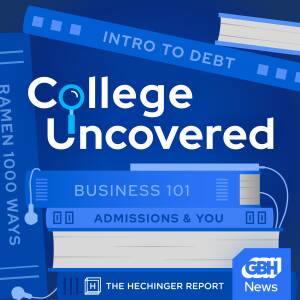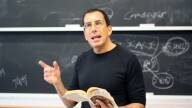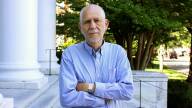Episodes
-
Election Year Edition: The Politics of College
College Uncovered Season 3 is coming! First episode drops on Thursday, September 12th. In our first two seasons, GBH and The Hechinger Report explored the business of college admissions and paying for your education. Now we’re back with a special election year season, helping you navigate the politics of American colleges and universities.College Uncovered is hosted by Kirk Carapezza and Jon Marcus, journalists with decades of experience who specialize in covering higher education in the U.S. They offer students and their families an unvarnished look at a uniquely American system, so YOU can make fully informed choices.One episode will drop weekly and will be available wherever you listen to podcasts. -
[Bonus]: Dear College - Tayana Antoine
The essay is a vital piece in the college application puzzle; portraying the strengths and challenges of aspiring high school students. In this bonus episode of "College Uncovered," Tayana Antoine describes for the producers of the "Dear College" podcast, the similarities between a teen mom and an older sister. How her dual role as caretaker for her siblings and maturing adult sometimes can clash but also brings her much delight.Learn more about the Dear College podcast here: www.dearcollegepodcast.org -
[Bonus]: Dear College - Jenessa Otabor
College application essays demonstrate literacy and creativity of high school students striving for higher education. As the producers of the "Dear College" podcast have found, what this rising generation says about themselves says a lot about all of us. In this bonus episode of "College Uncovered," Jenessa Otabor shares how a recent educational opportunity turned from stressful to rewarding; once she learned how to speak up for herself. Learn more about the Dear College podcast here: www.dearcollegepodcast.org -
S2 Eps 8 - What do college students learn, anyway?
While there are a lot of tests to get into college, there are no exit exams to get out. Despite the soaring price of tuition and the benefits a degree offers, researchers have found that undergrads often spend little time studying compared to other activities like working, socializing or partying. As a result, many show limited gains in critical thinking — the hallmark of American higher education. -
S2 Eps 7 - Junk Fees
Students at one New York university have a surprise awaiting them: an $8,000-a-year “academic excellence fee.” We have to ask: Isn’t academic excellence included in tuition? In fact, tuition is only part of the cost of college. Like car dealerships, schools are nickel-and-diming consumers with huge fees — fees for student activities, fees for athletics, fees for building maintenance, fees for libraries, even fees for graduation, the bills for which arrive just as students and their families thought they were finally done paying for college. -
S2 Eps 6 - The Other College Debt
Student loans aren’t the only kind of university debt. Colleges and universities have borrowed billions, mostly to build new dorms, dining halls and facilities, spaces they may – or may not – need as student enrollment declines nationally. Today, nearly 10 cents of every dollar in university budgets helps pay interest on institutional debt. -
S2 Eps 5 - The real cost of "free"
To boost enrollment and meet workforce needs, more states are offering free community college programs. But do these programs effectively help students graduate from college? And by offering college for free, does that diminish its value? We look at the research, as well as a new free college program in Massachusetts and an old one in Tennessee, where community college has been free for years.“College Uncovered” is made possible by Lumina Foundation. -
S2 Ep4 - Closing time
Okay, so you’re going to college. But will the college you pick still have its lights on before you graduate? It’s a question more and more families face as colleges experience financial and enrollment challenges that force them to close or merge. We’ll look at what colleges are doing to stay alive, whether should states disclose institutions’ financial health to consumers, and what happens to students - and their credits - when their school suddenly shuts down. -
S2 Ep3 - Half off full price
Universities dole out more than half of the revenue they collect from tuition in the form of discounts and financial aid in their efforts to attract students. The US average is 56 percent. If a private company discounted its products by more than half, it would probably go out of business. So why do colleges use this self-destructive business model that leaves many prospective students thinking college costs more than it does? We explore. -
S2 Eps 2 - Bait and switch
Colleges work hard to make their prices seem much lower than they actually are. The problem has become so frustrating for families that now there’s an effort to fix it. But don’t hold your breath. Colleges are fighting attempts to make financial aid forms easier to compare and more understandable. We’ll give you tips on how to negotiate for more financial aid and ask for a better offer. -
S2 Eps 1 - Buyer beware
Congratulations, you got accepted to college! The next notification you’ll get: a financial aid offer, telling you what it will cost. And those financial aid offer letters are notoriously indecipherable and misleading, making it difficult to make college cost comparisons or even know how much you’ll owe. -

Season 2 is coming!
College Uncovered Season 2 is coming! First two episodes drop on Thursday, April 4th.----------Credits:Hosts: Kirk Carapezza & Jon MarcusSupervising Editor: Megan WoolhouseEditor: Jeff KeatingExecutive Producer: Ellen London Mixing and Sound Design: David Goodman & Gary MottTheme Song and original music: Left-RomanArtwork: Matt Welch Project Manager: Meiqian HeConsulting Producer and Head of GBH Podcasts: Devin Maverick RobinsCollege Uncovered is a production of GBH News and The Hechinger Report and made possible by Lumina Foundation.








